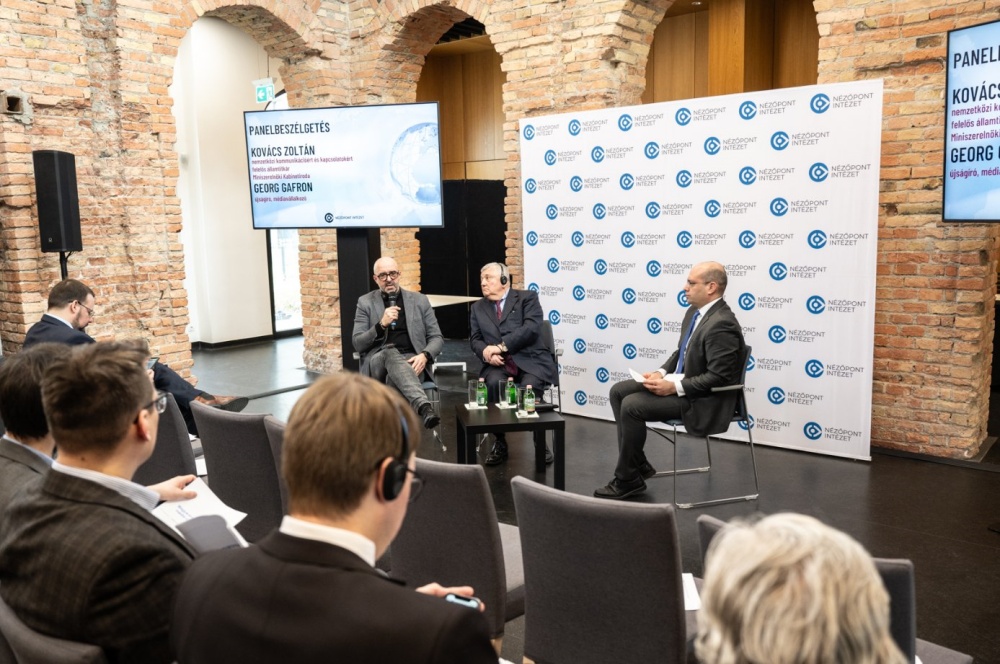
As the Prime Minister's chief advisor sees, journalism is now in competition with various media platforms.Continue reading

The government’s policy is not influenced by what the Western press says about it, Zoltán Kovács, State Secretary for International Communication and Relations, underlined at an event entitled “Hungary’s image in the world press 2024.”
Zoltán Kovács said that the aim of the media attacking Hungary is to make the government, which has won a two-thirds majority four times in a row, completely impossible to govern, and to quarantine it. There has been no chance to change this narrative in the past fourteen years, because the other side “is not interested in such a dialogue,” he claimed.
The government is trying to pursue a policy based on the national interest, on the interest of the Hungarian people, by preparing, taking, and implementing decisions, even if this conflicts with the ideas of other countries or with those of the European institutions,”
he pointed out.
Kovács expects that conflicts will not decrease in the future. Among the reasons, he pointed to Hungary’s pro-peace stance on the Russia-Ukraine war, the European Parliament election campaign, and the Hungarian EU presidency.
Bánk Levente Boros, Political Analysis Director at the Nézőpont Institute, explained that media coverage of Hungary had intensified in recent years, with 19,153 media reports on Hungary from 100 politically relevant online and print media products in 15 language areas covering 18 countries. This was mainly due to the Russian-Ukrainian war and Hungary’s pro-peace stance on it. The average number of media coverage of Hungary in the Russian press per media outlet was 139 in 2021, compared to 697 last year, he said.
Speaking about the divisive and polarizing nature of the war, the political scientist noted that
it is becoming increasingly common for Hungary’s neutral perception to turn either positive or negative.
In the Anglo-Saxon-speaking world, in particular, a previously neutral stance has turned critical, while the previously neutral Russian press has increasingly referred to Hungary in a positive context. He also noted that there was a small but growing number of positive articles about Hungary in French, Spanish, English, and Italian, while the number of positive Polish articles fell last year.
In the final part of the event, Ágoston Sámuel Mráz, head of the Nézőpont Institute, discussed Hungary’s press coverage in the West with Kovács and Georg Gafron, German journalist and media entrepreneur. In Gafron’s opinion, critical views are also in the majority, and Kovács commented that for a long time he has not seen any positive portrayal of Hungary in the German mainstream press.
Our government’s policies are rooted in the national interest and realities, not influenced by Western media coverage. Despite fourteen years of unchanging narratives aimed at isolating Hungary’s democratically elected government, our commitment to realistic policymaking… pic.twitter.com/UQOglZjGTm
— Zoltan Kovacs (@zoltanspox) February 15, 2024
The German journalist said that
one should not be a propagandist or a philosopher, but present the reality, and added that four fifths of German journalists write from the perspective of the Greens or the Social Democrats.
On the pro-peace stance, the German journalist also said that in Germany, more than two thirds of the population are in favor of supporting the Ukrainians and are very afraid of the Russians, which is why they are less understanding of Hungary’s pro-peace stance. Kovács pointed out that as the war dragged on, reality was increasingly “knocking on the door” of Western Europe. He reiterated that the national interest, not foreign opinion, will determine what the government does.
Via MTI, Featured image: X/Zoltan Kovacs